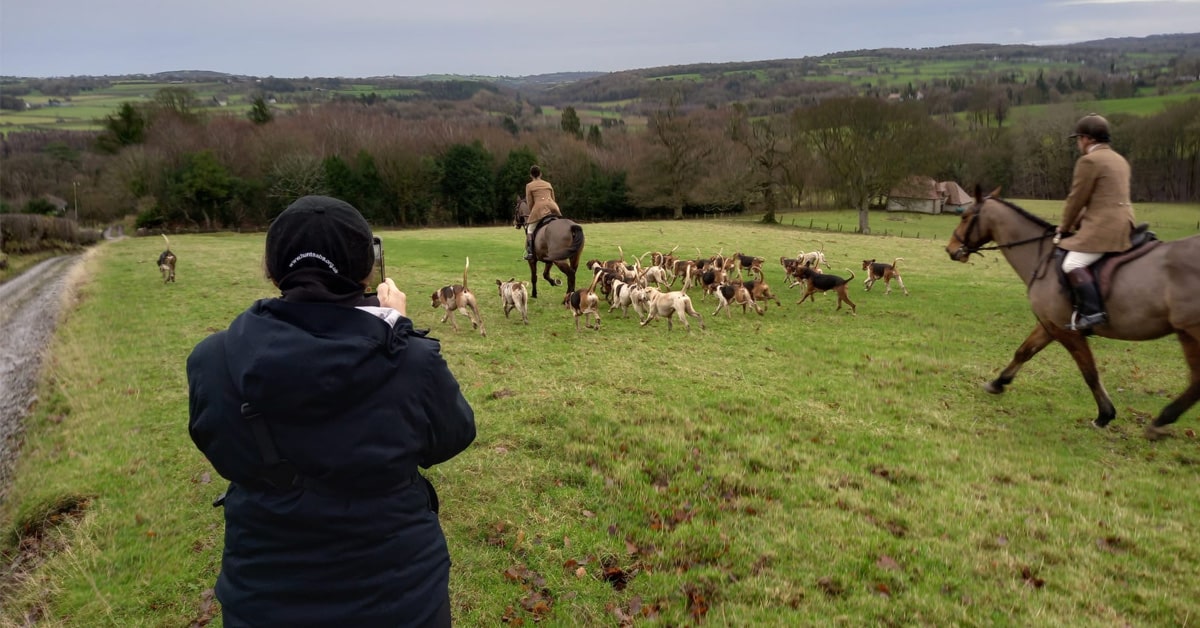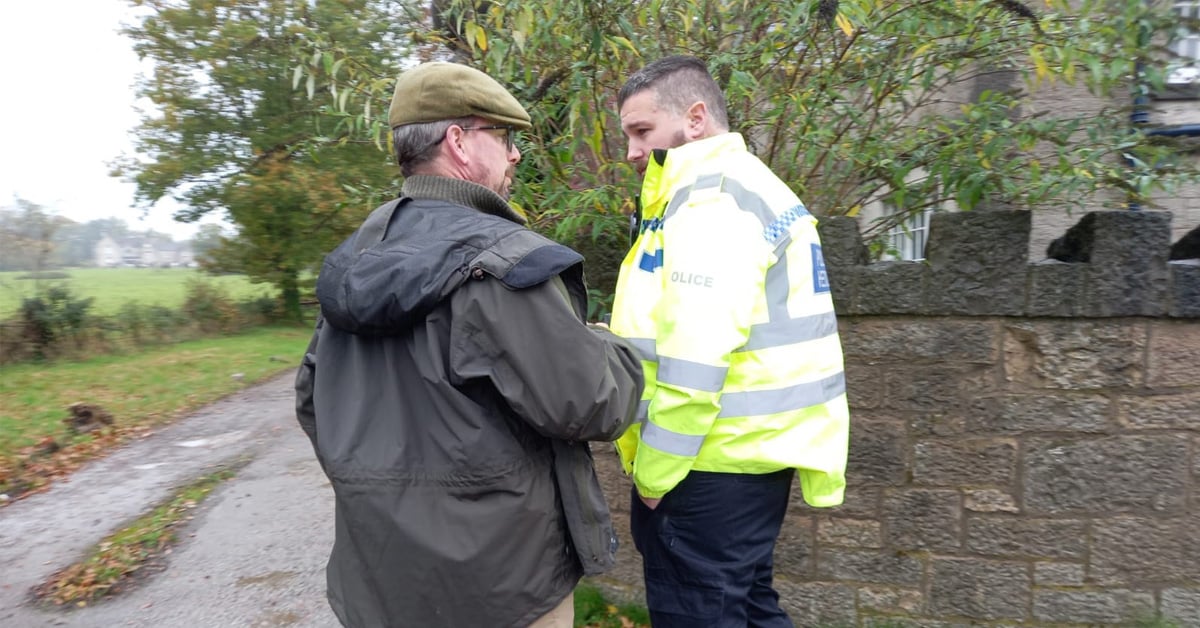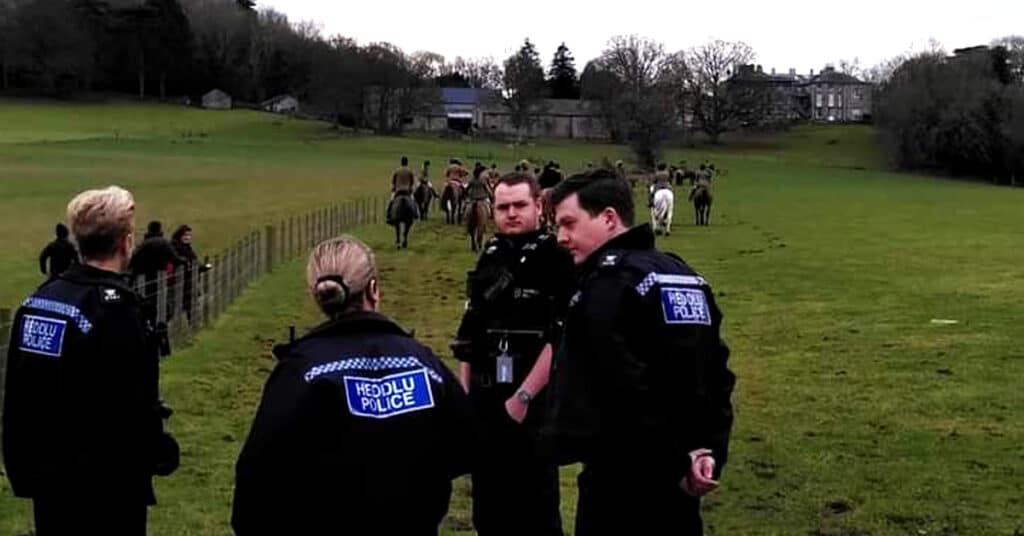A recently published review reveals the complexities of policing the Hunting Act in North Wales. And it shows that it’s high time for new legislation.
On 12 January, Glyndwr University’s Social Inclusion Research Institute (Cyfiawnder) published a long-awaited review into policing of the Hunting Act in North Wales. As Protect the Wild previously covered, the review was commissioned by North Wales Police and Crime Commissioner, Andy Dunbobbin, in November 2021.
The 67-page report looked at evidence and data the team at Cyfiawnder, led by Iolo Maddoc-Jones, gathered from multiple sources. These included surveys, interviews, photos and videos, and direct access to police records. The review also involved people from multiple parties including hunt saboteurs and monitors, hunters and their supporters, and police officers. It only took into account incidents that occurred between 1 January 2018 and 16 March 2020, totalling 57 cases that passed its own requirements for inclusion.
The review said all of this evidence was examined to produce evidence in four key areas:
- Challenges in enforcing and prosecuting through the Hunting Act.
- What does good practice mean when it comes to policing the hunting ban?
- North Wales Police’s performance in acting on the Hunting Act and other incidents related to hunting.
- North Wales Police’s compliance with national standards of recording, responding, investigating and prosecuting Hunting Act incidents.
It then made ten recommendations based on its findings.
Some of these reinforce claims that hunt saboteurs, monitors and anti-hunting campaigners have made for years. But not everything in the review is clear cut.

The police prioritised public disorder over illegal hunting
The review itself stated its headline finding is that North Wales Police lacked “an investigate mindset” in “too many” Hunting Act-related incidents. This is despite the force responding “in a way that was in line with National Standards”. As it clarified later in the document, what this meant is that Cyfiawnder reviewed several cases where police didn’t seek full details in reports of illegal hunting, closed the case too quickly, or let the six-month limit overrun without clear rationale.
Section 6.2.9 provided one example of this:
“In another call, there was a similar lack of interest in the detail of the alleged ‘illegal hunt’ being reported and the case was closed because with the stated rationale being no suggestion of any disorder.”
And the review revealed that this priority focus on public order came as a detriment to police interest in illegal hunting. It said in section 6.2.6 that police officers “were more focussed and thorough” when an allegation of criminal activity was “more familiar to them” such as public order offences. As a result:
“the focus of the ‘Investigative Assessment’ was not always on the reported [hunting] offence but rather on the potential for disorder associated with it”
Cyfiawnder said that the police itself recognised it targeted hunt saboteurs more frequently on this basis. However the police respondents claimed that, rather than this resulting from a bias, it was a result of hunt saboteurs engaging in “highly visible” acts such as public order offences and aggravated trespass. It shared an unattributed quote, seemingly from a police officer, that said:
“Most of the things we deal with, yeah, are mostly against the sabs, I’ll be perfectly honest about that, the balance there is most likely wrong but the problem with it is if the hunts are saying they’re trail hunting what can we do about it; but if there’s aggravated trespass and footage of it, which tends to be more clear cut and right in front of us, we’ve got to act on it.”
Yet, in an incredible statement later in the review, it says police officers responding to the survey:
“suggested that it was in the nature of hunt sabotage for those engaged in it to be the instigators of confrontation.”
The review doesn’t provide any examples of these claims. It also doesn’t look at how this belief influences police officers that already prioritise public order offences over Hunting Act offences.

“Heavily edited” footage?
The review is also critical of what it views as failures by hunt saboteurs and monitors. Prosecutorial challenges arose from anti-hunting activists providing evidence that often wasn’t as clear as the activists themselves may have believed. It cited videos that are “heavily edited”, “grainy” or lacking in a timestamp. However, North Wales Hunt Saboteurs told Protect the Wild that it believes neither the police nor CPS have dropped a case due to edited footage.
Cyfiawnder’s review team also highlighted police claims that activists were unwilling to provide statements supporting submitted evidence. However, data collected by the review goes some way to explaining this. In section 5.2.11, the review showed respondents saying why they didn’t go to the police after witnessing a crime. Thirty six people responded – most of whom must have been anti-hunt, as only four people related to hunting participated. Of the 36 people, 43% said they believed that the police wouldn’t take an interest. A further 33% said that past experiences had led them to not engaging with the police.
While this isn’t specifically about follow up statements of submitted evidence, it showed there is grounded reasoning by those involved in tackling hunting in north Wales for not further engaging with the police.
Hunters are pretty pleased with how they’re policed
Throughout section 5.2, “Survey findings”, the review repeatedly showed that those involved with hunting are significantly happier with the way North Wales Police act than those opposed to hunting. In section 5.2.4, for example, it said that all three pro-hunting respondents that answered a question on how satisfied they were with policing response marked themselves as fairly or very satisfied. And Section 5.2.20 showed that 46% of people involved with hunting believe police treat everyone fairly all or most of the time.

By contrast, in section 5.2.4, only two of 12 anti-hunting respondents and three of 15 respondents affected by hunting (but not themselves hunters or hunt saboteurs) were fairly or very satisfied with policing response.
This may stem from the type of relationship the police had developed with the hunt. In August 2019, for example, the Canary reported on court documents that showed police drone operators tipping off Ed Lloyd-Ellis, a member of the Flint and Denbigh Hunt, to the presence of hunt saboteurs. And a video originally published by Welsh Borders Hunt Saboteurs showed how Lloyd-Ellis already appeared to have the personal contact details of a North Wales Police officer in 2015. Furthermore, as the review itself notes, North Wales Police had “maintained lines of communication” with hunts in the region since 2016 through Operation Yarder. On the other hand, hunt saboteurs were unaware the operation even existed until a bizarre series of events led to its public exposure in 2019.
There is also evidence of direct connections between police and hunts. North Wales Hunt Saboteurs posted in June 2020 that chief constable of North Wales Police, Carl Foulkes, sits on the Police and Community Trust trustee committee alongside hunt member and former hare courser Henry Fetherstonhaugh. Davina, Henry’s wife, is a joint master of the Flint and Denbigh Hunt.

There is no public evidence showing that these types of relationships have led to biased policing. However, it provides an interesting backdrop to the overwhelming happiness hunt members and supporters have for how they were previously policed. The review touches on this in sections 5.9.2. to 5.9.4, but concludes that investigating such issues is beyond the scope of the research.
The review said in section 5.6.4 that “North Wales Police were clear they dealt with each party objectively”. However, it also noted in that the mechanisms of this alleged lack of bias weren’t made clear.
As a partial reason for why anti-hunting activists felt they were unable to engage with the police further, the review also highlighted that the ‘victim’ in a Hunting Act case is the Crown. Hunt saboteurs and monitors are regarded as witnesses. Therefore, the police and CPS have no legal obligation to keep sabs and monitors informed of updates to a case. It suggested that this legal quirk fuelled “Perceptions that police did not act on ‘good’ evidence”.
The one area where the tables appeared to turn, though, is when a case reached the courts. In section 5.2.9 a lone respondent from the hunting community responded to a question about court proceedings. They said they were dissatisfied with the process and it was biased towards “anti-hunt protestors”.
Underwhelming results
The review is lengthy and impossible to fully explore in this article. For example, other areas covered include problems policing the Hunting Act that are inherent to hunting itself. These included the complexity of the Hunting Act, the “inexperience” of some officers with regards to this law, the fact that hunting takes place on private land away from the “public gaze”, and a lack in most cases of what courts would consider an “independent witness”.
It concludes that North Wales Police’s enforcement of the Hunting Act aligns “well with good practice guides”. But it also notes that there are key areas for improvement, such as ensuring the “fine detail” of implementing the Hunting Act is appropriately addressed. It also says North Wales Police need to make sure its “ethical and values base” is aligned to the police-standard framework that refers to “impartiality; integrity; public service and transparency”.

Nothing surprising in the review
Nothing surprising emerges from the review for anyone that follows the anti-hunting movement closely. Despite the occasional spectacular statement, the review makes it clear that the policing process itself is difficult because the Hunting Act itself is a complicated and murky law. But it also doesn’t appear to point towards much meaningful change, choosing instead to say ‘do the job properly’. The danger, then, is that North Wales Police use the review to claim they’re improving in this area while not actually doing anything at all to change.
Sabs report this may already be in evidence on the ground. Cyfiawnder’s team itself notes that policing across England and Wales changed significantly following the conviction of former senior hunter Mark Hankinson, and North Wales Hunt Saboteurs noted in a press statement that police appeared more frequently at hunts once the review was announced. Yet a year on, the group said that since the start of the 2022/23 season, police were “once again” failing to attend hunts.
The review is, of course, not a review of the Hunting Act but of how it’s policed. What it reveals is how the legislation is a gift to hunting exactly because of the complexity of policing it. And, as a result, there are two conclusions that we – as those opposing the hunting industry – can draw from it: first, that sabotage itself remains the foremost method of driving the hunting industry into the ground; and second, that the Hunting Act needs strengthening or replacing with a law that will shut down hunting kennels permanently.
It doesn’t have to be this way. Help Protect the Wild demand that the law is strengthened by sending a letter from our website.

